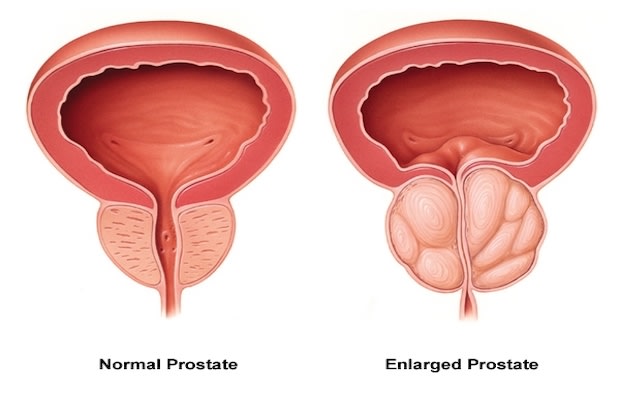Table of Contents
II. Avoid Processed and Red Meat
VI. Throw Out Those Cigarettes!
Importance of the Prostate
The prostate is a small but important gland located deep within the groin. The prostate is around the size of a ping pong ball and is essential in the male reproductive system, especially in the production of semen. When a man ejaculates, the prostate squeezes seminal fluid into the urethra and is expelled with sperm. [1]
Prostate problems are quite common in older men because the gland tends to grow larger with age. An increased frequency of urination is typically the first sign of prostate issues because an enlarged prostate can squeeze the urethra and cause problems with urination. Symptoms can vary depending on the type of condition, but general prostate disorder symptoms can include:
- Frequent urination
- Blood in the urine
- The onset of erectile dysfunction
- Discomfort or pain when sitting
- Weak or interrupted urine flow
- Strain when emptying the bladder
- Blood in seminal fluid
- Dribbling urine
- Not being able to urinate [2]
Several conditions may occur as the prostate ages, including benign prostatic hyperplasia (prostate enlargement), prostatitis (inflammation of the prostate), or prostate cancer. Millions of men experience these problems every year in the United States, and medications like Cialis (tadalafil) and Androcur can be used to treat some symptoms of prostate disorders. [3] If your doctor has prescribed medication like Cialis for a prostate disorder you can order it online through RxConnected to save money. Medications are helpful and necessary, but there are several things you can do at home as well. Read on to learn more about tips to prevent prostate problems. [3] Several studies suggest that a diet high in red meat may increase your risk of prostate problems, especially prostate cancer. This may be due to heterocyclic amines (HCAs), which are carcinogens found in cooked meat. HCAs are chemicals formed when muscle meat, like poultry, beef, pork, or fish are cooked at high temperatures in a pan, grill, or over a fire. HCAs can damage DNA after enzymes metabolize them in the body. These enzymes' activity can differ from person to person, but generally, the presence of HCAs in the body has been linked to cancer risks. [4] Avoiding processed meats can lower the risk of developing prostate problems and cancer. You can replace red or processed meats with the following protein sources: Meat alternatives can also be used to reduce the presence of cancerous enzymes in the body. You can experiment with eating meatless meals once or twice a week. Eating black bean burgers, tofu, fish, or bean stews can help implement new eating routines. [5] Milk does possess lots of calcium and vitamins, but drinking milk in excessive amounts may contribute to prostate issues and eventually, prostate cancer. In the American Journal of Clinical Nutrition, researchers looked at data from 32 studies that detailed the effect of whole milk, low-fat milk, cheese, and dietary calcium. It was found that the consumption of these dairy products incrementally increased the risk of prostate cancer. [6] Another study in the Physicians Health Study followed 21,660 people for 28 years. The study found that those who consumed more than 2.5 servings of dairy a day had an increased risk of prostate cancer than those who consumed 0.5 servings of dairy products or less a day. [6] Over the years, many dairy alternatives have hit the market. If you want to consume milk, but lower your risk of worsening prostate problems, you can try: Keeping the body active is important for everyone, but it can make a huge difference in the battle against prostate problems. For people with benign prostatic hyperplasia (BPH), low to moderate physical activity, like regular walks, can yield prostate benefits. Harvard-based health professionals have also found that participating in aerobic exercise three times a week improved pain in prostatitis patients after 18 weeks. Those who exercised reported less pain, anxiety, depression, and a better quality of life. [8] If a man is already diagnosed with early-stage prostate cancer, then brisk walks may also help. In one study of 1,400 men with early-stage prostate cancer, walking three hours a week was shown to slow down cancer progress by 57 percent. [8] Moving your legs is always a good thing to do, but there are also prostate-specific exercises you can implement. Because prostate problems can lead to bladder issues, kegel exercises can help strengthen the pelvic floor muscles. Many people associate kegel exercises with women, but anyone can do them. To find the muscles of the pelvic floor, try to urinate a few seconds and stop mid-stream. Once you've determined your pelvic floor muscles, you can tighten those muscles for three seconds and relax for three seconds. These exercises can be hard to master, but with practice, you can learn to isolate the muscles and improve bladder issues. [9] Typically, it is advised to consume everything in moderation. This is true in most cases, but some studies suggest drinking four to five cups of coffee a day can lower your risk of fatal prostate cancer. The National Library of Medicine cites that every three cups of coffee consumed can reduce your risk of fatal prostate cancer by 11 percent. One 2015 Norwegian study found that boiled coffee (not used with a filter) has a higher probability of health benefits than other methods. [10] Coffee and prostate disorders have a dose-response relationship. This means that the amount of coffee consumed can affect the condition of prostate cancer. Researchers have found that the effects of coffee are only present in higher doses (three or four cups a day) but these findings do not extend to the occasional cup of coffee. Drinking coffee is not a cure-all for prostate disorders, but drinking your fair share of coffee does not appear to hinder prostate conditions. Coffee may not harm the prostate, but it is vital not to overdose on caffeine. Too much caffeine can cause major health issues like seizures and irregular heartbeat. It is important not to consume more than 400 milligrams of caffeine a day or about four brewed coffee cups. [11] Smoking can harm just about every function of the body. The prostate is no exception. One study from the Harvard School of Public Health found that men with prostate cancer who smoke have a higher risk of cancer recurrence and early death. This study also found that smokers with prostate cancer had a 61 percent increased risk of dying from prostate cancer. These numbers differ greatly from non-smokers or those who have quit smoking for over ten years. In these men, prostate cancer mortality was similar to men who have never smoked. [12] A prolonged smoking habit can also result in comorbidities and complications that can occur along with prostate cancer. Thus, it is essential to cut cigarettes out of your daily routine to increase your chance of surviving cancer. Prostate cancer is the second leading cause of cancer death in American men. One in six U.S. men will be affected by prostate cancer in their lifetime. Quitting smoking can be difficult, so talk to your doctor about treatment options to improve your chances of kicking this dangerous habit. [12] The content in this article is intended for informational purposes only. This website does not provide medical advice. In all circumstances, you should always seek the advice of your physician and/or other qualified health professionals(s) for drug, medical condition, or treatment advice. The content provided on this website is not a substitute for professional medical advice, diagnosis or treatment.
Avoid Processed and Red Meat

Avoid Lots of Milk
Get Plenty of Exercise
Have a Cup of Coffee

Throw Out Those Cigarettes!

